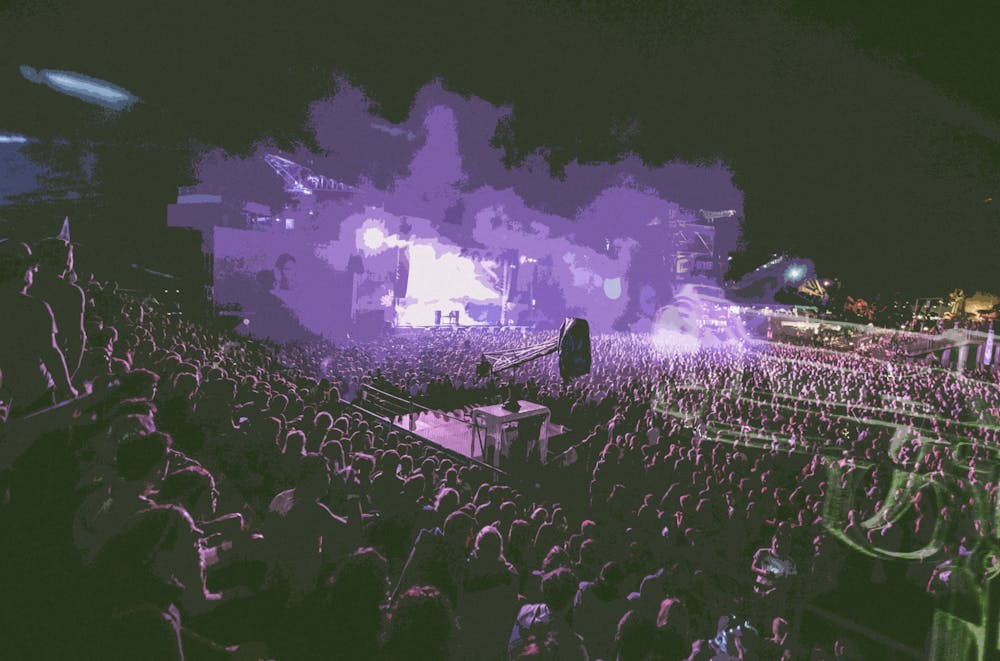The American epidemic of gun violence has infiltrated the increasingly popular genre of hip–hop. In the past few years, it seems as if the hip–hop community has been hit with endless tragedy. In the late 1990s, the deaths of Biggie Smalls and Tupac Shakur were a devastating anomaly. Now, since 2018, at least one big hip–hop name has died a gun–related death each year, leading fans and celebrities to call for gun reform across the country. But unsurprisingly, the media continues to blame the hip–hop genre itself for the senseless murders, rather than the true culprit: guns.
Takeoff, one–third of the Grammy award–winning hip hop trio Migos, was shot and killed in Houston, Texas on Nov. 1, 2022. Gunfire erupted at 2:30 a.m. outside a private party at a bowling alley where Takeoff and his cousin Offset (another member of Migos) were in attendance. Police are still investigating the incident, and Takeoff’s death has been ruled a homicide.
Takeoff’s death, while shocking, is nothing new for the hip–hop community. In 2018, the world was rattled by the death of XXXTentacion, an extremely popular emo rap sensation. He was killed in a targeted murder outside a car dealership at just 20 years old. Less than a year later, we saw the death of Nipsey Hussle, a West Coast rapper known for his inspiring journey from gang member to community activist; he was shot outside his clothing store in a premeditated attack. In 2020, two more mainstream rappers were lost: Brooklyn’s Pop Smoke was shot to death in a home invasion and Chicago's King Von was killed in an altercation outside a hookah lounge. And in 2022, just a month before Takeoff’s death, PnB Rock was robbed and shot to death while eating lunch with his girlfriend at a restaurant. These are just a few of the many gun–related deaths that plagued the hip–hop community in the past five years.
Unfortunately, the deaths of these young rappers are not being treated as a tragedy, but rather as another reason for critics to vilify the hip–hop genre. Hip–hop music was a pivotal creation for marginalized Black America in the post–Civil Rights era. But since its rise in the 1970s, the genre has faced harsh criticism for the language used and messages portrayed in songs. Critics claim that the language used in rap music is derogatory and “damaging” to young Americans. Hip–hop music has become a scapegoat, with the media condemning and blaming Black culture for a nationwide issue.
The claim is that the violent nature of lyrics in hip–hop music successively perpetuates violence in hip–hop communities, explaining the increasing amount of deaths. The problem with these claims is that every genre of music uses this language, too. A study done by the University of Missouri found that pop music, a generally white–dominated genre, is just as violent and sexist as hip–hop. Researchers cited several examples of blatant violence in mainstream pop music, like Maroon 5’s “Wake Up Call;” this song tells the story of a man who shot his girlfriend’s lover to death ('Came without a warning, so I had to shoot him dead; he won't come around here anymore').
Though the media asserts that violent lyrics cause real–life violence when it comes to hip–hop, they don’t discuss this correlation with other genres. Notably, the “27 Club” is a tragic, coincidental phenomenon that became widely known after rock music fans noticed that significant rock stars Jim Morrison (The Doors), Janis Joplin, Brian Jones (The Rolling Stones), Jimi Hendrix, Kurt Cobain (Nirvana), and Amy Winehouse all died at the age of 27. All six of these musicians’ deaths were drug–related. Drug use and addiction is a common theme in classic rock, yet the media never equates rock stars’ drug–related deaths to the genre itself. Rather, the stars are mourned gracefully, and rock music continues to be seen as an American staple.
The real problem that needs to be addressed is not the “vulgarity” of hip–hop music, but rather the gun violence epidemic in America. The United States is infamously known for high levels of gun violence, with 53 people being killed by a firearm every day. Of all developed nations in the world, the US ratio of 120.5 firearms per 100 residents far surpasses any other country. The United Kingdom, for example, also has a prevalent hip–hop scene, with UK Drill Rap rising in popularity. This music is very similar to US rap music, with frequent talk of violence, hedonism, and criminal lifestyles. But rappers in the UK aren’t being shot to death every few months, likely because the UK maintains arguably the strictest gun laws among developed countries.
The vilification of hip–hop music needs to end. So rather than pointing a finger at hip–hop music in the United States, we need to attack the problem at its core. Homicides, suicides, and mass shootings are rampant in the United States, and not just in Black communities. It's important that hip–hop music, a way for marginalized Black Americans to express themselves, is celebrated rather than criticized. These artists deserve to be mourned, and the hip–hop community deserves our sympathy.

